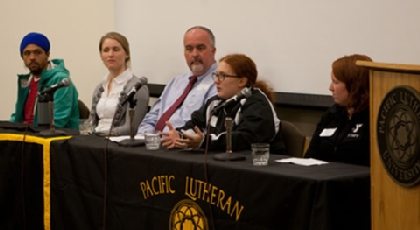Page 2 • (4,570 results in 0.034 seconds)
-
PLU's First-Year Experience Program has three learning outcomes integrated throughout the curriculum (including curricular and co-curricular activities).
explain varying assumptions behind and consequences of ideas. Community Students will contribute to collaborative communities of learning, including classrooms, small cohorts, and larger academic conversations.
-
1. Implement evidence-based practice, incorporating theory, models, and science to ensure safe, quality health care. 2.
MSN Programs Outcomes1. Implement evidence-based practice, incorporating theory, models, and science to ensure safe, quality health care. 2. Integrate knowledge of technology, information systems, policy, organization, and financing into the improvement of health care delivery and health outcomes. 3. Demonstrate a commitment to ethical decision making, social justice, and advocacy for vulnerable and diverse populations. 4. Develop and use collaborative leadership and management strategies that
-
Learners will be able to demonstrate and apply their understanding of fundamental concepts by successfully solving a variety of physics problems in different contexts.
collaboration in group and team environments, such as group problem solving and laboratory experiments. A detailed list of collaborative activities is provided within the learning outcomes of each course, included in the course syllabus. Learners will be able to computationally solve physics and/or engineering problems using software packages such as spreadsheets, numerical integration, matrix multiplication tools, or symbolic manipulation (computer algebra) systems, as appropriate for employment or for
-
APPLY HERE
Candidates are committed to: Teaching science or mathematics in a middle school or high school in a high-need school district for 2 years after completion of the Masters program Addressing education inequities Learning to teach in culturally sustaining ways Being a member of a cohort To Apply: Submit a completed application to study in the PLU MAE program and complete the CS-STEM Teacher Candidate Application using the link below. Candidates will have an interview. Those selected as CS-STEM Teacher
-
The Confucius Institute of the State of Washington partners with the Chongqing Municipal Education Commission and Hanban to sponsor visiting teachers to teach in K-12 schools in Washington.
Chinese Guest Teacher ProgramThe Confucius Institute of the State of Washington partners with the Chongqing Municipal Education Commission and Hanban to sponsor visiting teachers to teach in K-12 schools in Washington. Whenever possible, these teachers come from partner schools to CIWA-sponsored Confucius Classrooms in Washington. Washington schools request visiting teachers in the fall, then the teachers are selected in Chongqing and sent to Beijing for further training and interviews. In the
-
Build historical knowledge. Develop historical methods. Recognize the provisional nature of knowledge, the disciplinary preference for complexity, and the comfort with ambiguity that history
. Use historical perspective as central to active citizenship. Learning Outcomes for Lower-Division CoursesThe History Department has structured all 100-200-level courses to create the following learning outcomes for students who complete them successfully. Students will: 1. Learn and practice the evaluation of historical evidence by identifying and explaining specific claims or ideas in primary and secondary sources. 2. Practice skills of oral expression and dialogue through interpreting and
-

A passion for learning is explored By Chris Albert The route to being an educator may vary, but a key ingredient is being passionate about being a life-long learner. It’s a sentiment the panel of current educators and PLU alumni shared with students during the…
October 28, 2011 A passion for learning is explored By Chris Albert The route to being an educator may vary, but a key ingredient is being passionate about being a life-long learner. It’s a sentiment the panel of current educators and PLU alumni shared with students during the Career Connections in Education discussion in October. A panel of PLU alumni share their experiences with current students about life as educators. “You have to have that whole idea that you’re going to be a life-long
-
Seattle Christian School is inviting qualified candidates to apply for the position of HS Chemistry Teacher for the 2022-23 school year. Role Qualifications Possess or be able to acquire a valid Washington State teaching certificate and ACSI certificate Hold a bachelor’s degree or higher in education, a…
both heart and skill. Professional Collaboration & Communication: Collaborates and engages effectively with peers, administration, and families in a manner that promotes clarity, unity, honor, partnership, and learning for all students. To apply for a teacher position please access the Teacher Application on the website and submit to Janel Greig. For a complete job description, click this link. Read Previous Green Chemistry Internship Read Next ACS Graduate School Readiness & Professional
-
Learning doesn't end when you graduate! PLU offers virtual webinars on interesting and current topics as well as lectures, conferences, and workshops on campus throughout the year that are open to
Lifelong Learning OpportunitiesPLU Lectures, Presentations & WorkshopsLearning doesn’t end when you graduate! PLU offers virtual webinars on interesting and current topics as well as lectures, conferences, and workshops on campus throughout the year that are open to the public! Continue your quest for knowledge, engagement, and critical thinking as you explore new ideas, challenge your beliefs, and listen to new perspectives from diverse groups.Lectures, Presentations & WorkshopsLivestreamStay
-
The Culturally Sustaining - STEM Teaching Program is funded by the National Science Foundation's Robert Noyce Teacher Scholarship Program.
Funding for CS-STEM ProgramThe Culturally Sustaining – STEM Teaching Program is funded by the National Science Foundation’s Robert Noyce Teacher Scholarship Program. Faculty at PLU obtained funding to provide forgivable loans for teacher candidates and for mentoring support and for the development of an induction program. This work was initiated when Drs. Simic Muller, Gardiner, and Seidel were awarded a Capacity Building Noyce Grant (Award Number 1758506), titled, “Building Capacity to Prepare
Do you have any feedback for us? If so, feel free to use our Feedback Form.


